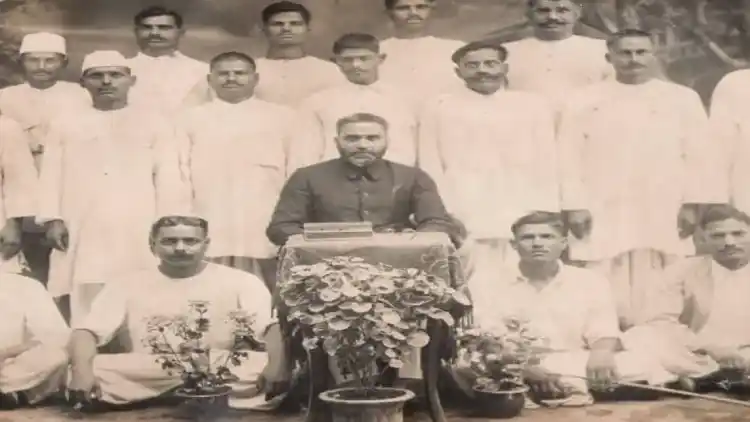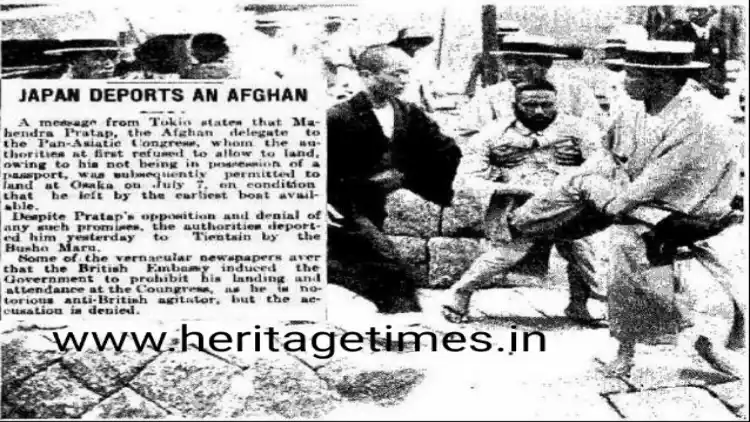
Saquib Salim
“I believe in the unity of religions and Islam is also my religion.”
This is what Raja Mahendra Pratap had told people in Mongolia during his visit in 1920s.
Raja Mahendra Pratap, who fought for India’s freedom and worked to spread love among humans, was a selfless soul; he would never strive for a post or a position. Today, as Prime Minister Narendra Modi inaugurates a university named after him, it is high time to remember the ideals this man stood for.
Mahendra Pratap was born to Raja Ghanshiam Singh Bahadur of Mursan, in Aligarh, in 1886. At the age of three, he was adopted by Raja Harnarain Singh of Hathras. The family had revenue rights over several villages in Aligarh, Mathura and Bulandshahr. Though they practised Vaishnavite religion along with Arya Samaj’s interpretation of the Vedic religion, his family was a living example of the syncretism.
In Mahendra’s own words, “Our family has been always pro-Islam in spite of our orthodox Vaishnav religion. The title of ‘Raja Bahadur’ in the Mursan family was given originally by the Mughal emperors. Our father Raja Ghanshiam Singh Bahadur of Mursan was versed enough in Persian language to translate Bharthari Shatak, from original Sanskrit, into Persian verse.”
No wonder that his initial education was started at home, where a Pandit taught him Hindi and a Moulvi taught Persian. Mahendra was eight when he was admitted to school. His father, a very close friend of Sir Syed Ahmad Khan, admitted him to Muhammadan Anglo Oriental (MAO) Collegiate School, founded by Sir Syed, in Aligarh. Sir Syed himself looked after Mahendra’s performance at school. He, later, recalled that once while he was playing in school, Sir Syed called him to check on his progress in studies. After the death of Sir Syed, his son Syed Mahmood, once told him that the grandson of Sir Syed, Ross Masood, and Mahendra were brothers.
 A rare picture of Raja Mahendra Pratap Singh as he is being forcibly deported from Japan to Afghanistan (Image Courtesy Heritage Times)
A rare picture of Raja Mahendra Pratap Singh as he is being forcibly deported from Japan to Afghanistan (Image Courtesy Heritage Times)
Mahendra recalled, in his autobiography, the teachers in MAO, like Ashraf Ali, who would fast on Janmashtami and great friends like Ahmad Hussain, with whom he shared a ‘brotherly’ bond. With such an upbringing, Mahendra always remained above the narrow religious differences and believed in humanity.
In 1913, while visiting Dwarka with his family he was asked by priests, “What is your caste?” An agitated Mahendra replied, “I am a sweeper.” The priests told him that he could not visit the temple in that case. Mahendra did not enter the temple while other family members paid their respects. Later, when the Governor of the province hosted him and personally wanted to take him to the temple, Mahendra told him, “I do not care to visit it (the temple) when it is guarded by people who have no regard for humanity.” He would employ people only on the condition that they didn’t practice caste based discrimination.
In 1914, the First World War broke out in Europe. Mahendra decided to enter the war theatre and do something to free India from the British rule. He took his secretary Harish Chandra (later known as Swami Shraddhananda) with him to Europe where he met famous revolutionaries like Shyamji Krishna Verma and Lala Har Dayal. In Geneva, he met the brother of Sarojini Naidu, who would take him to the Kaiser, the emperor of Germany. Germany was fighting against Britain in the war.
In Germany, he received letters of support for 26 Indian princes and a letter of the Amir of Afghanistan for support in the war.
Mahendra with Maulana Barkatullah, as his deputy, and German officials set out for Afghanistan. On the way, they stopped at Istanbul to meet the Sultan of Turkey to seek his support as well. The Sultan and his governors also assured him of their support to the Indian cause. After a long and hazardous journey through sea and deserts, they reached Herat, Afghanistan. The governor received them as state guests. Afghans provided them with good food and dresses. They were taken to different mosques for visits, where Mahendra was not asked to take off shoes, a gesture which surprised Mahendra.
They reached Kabul on 2 October, 1915. Maulana Ubaidullah Sindhi and his group had already reached there from India. Mahendra met the Amir of Afghanistan, Habibullah, and presented him the letters of the Kaiser of Germany and Sultan of Turkey. The Afghanistan government promised support to the Indian cause. A provisional government was soon formed with Raja Mahendra as the President, Maulana Barkatullah as the Prime Minister and Maulana Ubaidullah as the Home Minister. The government sent missions to different countries to garner support. The plan was to surround the British occupied India from all sides with hostile states, raise an army in Afghanistan, launch a war against the British army and free India.
Meanwhile at Kabul, Mahendra learnt Persian and wrote a book ‘Religion of Love.’ Mahendra proposed a religion where love for fellow humans would be the central faith. In his view, all the religions taught us the lessons of love and compassion. He believed in a formless God, who wants us to live in a good society. Hindus, Muslims, Christians, Sikhs, Jews and every other people were to believe in a central humanity which exists in all these faiths. Not only did he teach this, Mahendra practiced his doctrine. He specifically told Ubaidullah that after conquering India with the help of Afghans, he would not seek any post for himself. He would become a preacher of his religion of love.
After the war ended, and the plan could not succeed, he worked closely with King Amanullah of Afghanistan. As Amanullah’s messenger he toured to different countries to gather anti-British support. This is why he considered Afghanistan as his ‘adopted country’. A follower of his own religion of love in true sense, Raja Mahendra prayed at Gurudwara in Sikh traditions, at the temples of Arya Samaj, at Churches and offered Namaz at mosques. For this great Indian, religion teaches to love each other and it cannot be the reason for animosity.
A short essay, like this one, cannot do justice with this great son of India. Yet, through this article I want to pay tribute to the great man who epitomizes Indian culture and civilization in its true sense. In his own words;
“I fail, as I fail in the eyes of the world, because I won’t bribe, as they bribe, in the ways of the world. Then, I saw what they call failure, it is my success.”
Saquib Salim is an author is a Historian and a writer
